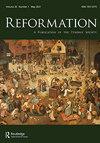The Book of Books: Biblical Interpretation, Literary Culture, and the Political Imagination from Erasmus to Milton
IF 1.1
0 RELIGION
引用次数: 0
Abstract
contortions” in The Spider and the Fly, a parable published in 1556. The pro-Marian work, read as a parable of the defeat of John Dudley, the Duke of Northumberland and Mary’s accession, works as a text of political counsel, in Walker’s reading as “Heywood’s most insistent attempt to counsel his queen on the benefits of moderation” (339). Yet as Mary’s reign progressed, Heywood’s “politics of merriness” waned, and his style lost its gadfly qualities, not least owing to the fact that he was an outsider in a court influenced by Mary’s Spanish husband, his entourage, and Cardinal Reginald Pole. Mary’s death and Queen Elizabeth’s accession with its restoration of reformed religion only exacerbated that outsider status so that, at the age of sixty-seven, Heywood felt forced into exile: Walker points to the prospect of a second Oath of Supremacy and the fact that his children were grown as strong factors in his decision to flee to the Netherlands in 1564. Yet his own sense of his writing as political counsel remained: Walker echoes Jane Flynn in identifying the poem “When all that is to was is brought” as Heywood’s, a work addressing his situation around 1564 as he prepared to leave England. A ballad serving as an ars moriendi, it counsels balancing earthly duties with God’s commandments, emphasizing penitence and the penance of exile as the way to salvation. Walker compares it to Heywood’s uncle Thomas More’s Tower cell A Dialogue of Comfort, as a model for personal resolution in a time of tribulation: yet Heywood’s ballad significantly does not end with a prayer for the queen, as all his other ballads had, and is recognized by Walker as “simultaneously a confession, an apologia, and a work of counsel” (373). Ultimately Walker places Heywood’s work within the tradition of civic religious drama of York, Chester, and his native Coventry, a tradition reflecting a lived experience of the religious life of the laity, a diverse and complex urban community. Heywood’s work too, even in its function as political counsel, impinged upon the very personal: moved continuously to reconcile various regimes’ orthodoxy with his own religious faith, he used verse to chart the Erasmian response to competing demands upon an artistic conscience.书中之书:从伊拉斯谟到弥尔顿的圣经诠释、文学文化和政治想象
扭曲”,1556年出版的寓言。这部支持玛丽安的作品被解读为诺森伯兰公爵约翰·达德利的失败和玛丽登基的寓言,是一部政治顾问的文本,沃克解读为“海伍德最坚持地试图就温和的好处向女王提供建议”(339)。然而,随着玛丽统治的发展,海伍德的“欢乐政治”逐渐衰落,他的风格也失去了牛鼻子的特质,尤其是因为他是一个受玛丽的西班牙丈夫、随行人员和红衣主教雷金纳德·波尔影响的宫廷局外人。玛丽的去世和伊丽莎白女王的加入以及宗教改革的恢复只会加剧这种局外人的地位,以至于在67岁时,海伍德感到被迫流亡:沃克指出,第二次至高无上的誓言的前景以及他的孩子们的成长是他1564年决定逃往荷兰的重要因素。然而,他自己作为政治顾问的写作意识仍然存在:沃克呼应了简·弗林,将《当一切都被带来时》这首诗认定为海伍德的诗,这首诗讲述了他在1564年左右准备离开英国时的处境。这是一首作为arsmoriendi的民谣,它建议平衡世俗的职责与上帝的戒律,强调忏悔和流放的忏悔是救赎的途径。沃克将其比作海伍德的叔叔托马斯·莫尔的《Tower cell A Dialogue of Comfort》,作为个人在苦难时期解决问题的典范:然而,海伍德的民谣并不像他所有其他民谣那样以为女王祈祷而结束,沃克认为这首歌“既是忏悔,也是道歉,也是一部律师作品”(373)。最终,沃克将海伍德的作品置于约克、切斯特和他的家乡考文垂的公民宗教戏剧传统中,这一传统反映了俗人的宗教生活经历,俗人是一个多样化而复杂的城市社区。海伍德的作品,即使是作为政治顾问的功能,也影响到了个人:他不断地将各种政权的正统观念与自己的宗教信仰相调和,他用诗歌来描绘伊拉斯谟对艺术良知的竞争要求的回应。
本文章由计算机程序翻译,如有差异,请以英文原文为准。
求助全文
约1分钟内获得全文
求助全文

 求助内容:
求助内容: 应助结果提醒方式:
应助结果提醒方式:


